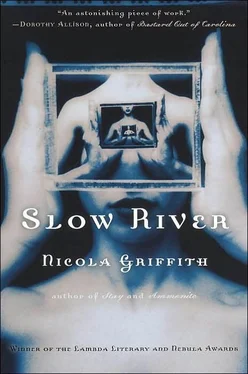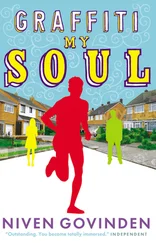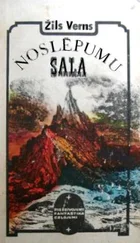The cat was pushed as far back against the wall as it could get. It hissed, hissed again. Its upper right canine was missing. Maybe it was old, and had come here to die. It moved its head back and forth, looking for a way past Lore.
She wondered what was in the kitchen that a cat might like to eat, and visions of the poor starved thing wolfing down cold rice, or scraps of two-day-old sushi or beans, trying to lick its whiskers afterward, made her sigh. Now she would have to feed it.
She brought out two saucers, one with raw egg, the other with defrosted ground veal. The cat was gone. She put the dishes down in the undergrowth anyway, and went back to her spade. She did not see the cat again that afternoon.
When it got dark, she went out one more time. The plates were empty. She smiled.
She watched the net but there was never anything about her kidnapping, no stories about bodies. Not surprising. She was old news: she had been taken at the end of August and it was now December. What was unusual was the absence of information about the van de Oests. Nothing.
She scanned the business then environmental sections—still nothing. It did not make sense.
And then one day, on the news, there were her father and Tok, standing shoulder to shoulder by the fountain at Ratnapida. Tok, she noticed, was taller than her father now.
“We know she’s out there somewhere,” Oster was saying, “and we want her to come home.”
Tok, circles under his eyes and a broken air to his stance, nodded. “Please,” he said directly to the camera, “Lore, come home. It’s… Everything’s sorted out.” He looked utterly defeated.
Four months ago, Tok, with just a few breathless sentences about why Stella had killed herself, had destroyed the image Lore had built of Oster over the years. She had loved her father; she had thought he loved her. But he was a monster. It had all been a lie. And now Tok—Tok, her brother, Stella’s twin—was siding with him, telling her to come home, it was all sorted out. She did not understand.
Although she and Spanner slept together, although she might owe her life to Spanner, Lore knew instinctively that letting Spanner see chinks in her armor was dangerous. So the afternoon Spanner called from the kitchen that they had run out of bread, and suggested that Lore go to the market because they needed some other things, too, Lore knew she would have to go, would have to conceal her fear and saunter casually out into the daylight on her own.
The day was thinly overcast. The clouds spread the light into an eye-aching blanket that made her wince. It was colder than it looked. Her breath, coming in great panicky gusts, froze like gauzy sheets in front of her face. She wished she had worn a hat. She did not go back for one; she knew she would not be able to leave again.
The market sign flashed three hundred yards away. Lore started walking. If she kept her eyes on the s she would be all right. She crossed at the ceramic safeway she and Spanner always used when going to the Polar Bear. Safe territory. Known. But then she was walking north along the pavement and people were walking in front of her and across her path and toward her. There was nowhere she could look where they would not be able to see her face. She walked faster.
The market was strange: small, but with that cavernous feel of tight-margin enterprise. She picked up a basket and wandered down the first aisle, trying hard to not look as bewildered as she felt. To look vulnerable was to be vulnerable. It was all bar codes and machine voices calling out prices as her basket passed. The only people she saw were shoppers.
She picked up a head of lettuce and turned it in her hand. There was dirt on the underside. She put it back on the piles of lettuces picked up another. They were all dirty. She chose one that seemed less grubby than the others, and moved on to the carrots. It was peculiar to see them all lined up on their sides and tied together in bunches. On the rare occasions she had shopped in the past, the vegetable section in Auckland had been a series of gleaming white vats, where the lettuces and dwarf radicchio, the spinach and bok choy grew hydroponically, right there in front of you. If you wanted something, you picked it yourself. You knew it was fresh, you knew where it had been, where it had come from. These vegetables seemed… dead. Not like real vegetables at all. Where had they been grown, and how? And how did you get them clean?
She laid the carrots alongside the lettuce. The aisles did not seem very well organized. After she had walked up and down them all twice, she found the bread next to the entrance.
She joined the lines at the checkout, realized that the woman in front of her, and the man next to her in another line, both had their vegetables in plastic bags. She wondered if they brought the bags with them. The line was the worst part. People in front of her, beside her, behind her, breathing her air, all comfortable, assured, confident through having undergone this simple procedure a hundred times, a thousand times. Natives in this particular stratum of culture. In a strange country, all Lore would have to do was smile and shrug, and say loudly in English or Dutch or French that she did not understand what she should do: foreigners were allowed to make mistakes. Natives were not.
She moved one step closer to the checkout. The woman in front of her turned casually, nodded, looked at her basket, turned back to the front. Lore almost panicked and threw down her bread and vegetables. Did normal people only buy vegetables and bread? Would the woman think she was strange because her things were not in plastic bags?
In her imagination that one casual glance became a searching stare, the nod a sharp gesture of condemnation.
Was it her hair? Her clothes? But then the woman was checking her goods through the scanner, V-handing her PIDA into the metal-and-ceramic jaws of the debit counter, packing her things—canned goods mostly—into a plastic string bag and leaving. The scanner bleeped at her softly. “Next customer, please. Next customer, please.”
Lore waved her lettuce and carrots and bread through the scanner one by one, as she had seen the woman do. Then she stuck the V of her hand into the debit counter. It clicked green. The man behind her cleared his throat impatiently. She scooped her things up and walked quickly out of the door. Eyes followed her as she almost ran back down Springbank, across the safeway.
Spanner was working when she got back, frowning over a pile of slates. Lore’s hands shook as she put the lettuce in the refrigerator. It was two days before she went back out into the garden.
One day Spanner came home around noon and announced that they would go to the park. To Lore’s relief, they took back streets and cut-throughs and crossed the long-abandoned railway line to enter the park from the side.
Pearson Park was a pocket-sized patch of green in the middle of the west side of the city. Once, it had been part of the estate of some rich Victorian family. The statues they had erected at the jubilee of Victoria, Queen of Great Britain and Empress of India, remained untouched. Victoria herself, her white marble jowls turning slightly green with moss—like the shadow of a beard—graced a plinth in the rose garden. Albert, Prince Consort, lorded it over the pond and its score of mallards and moorhens and muddy-looking geese. Most of the birds were now asleep on the tiny island, head under wing, or begging scraps of bread or rice from the few hardy souls, well-wrapped against the cold, who were eating lunch away from the office. An oak tree, probably not much younger than the statues, Lore thought, had been half pulled up, pushed sideways, and trained to grow across the pond: a gnarled, moss-slippery bridge. Its roots were dug like long, bony fingers into the asphalt of the path.
Читать дальше












